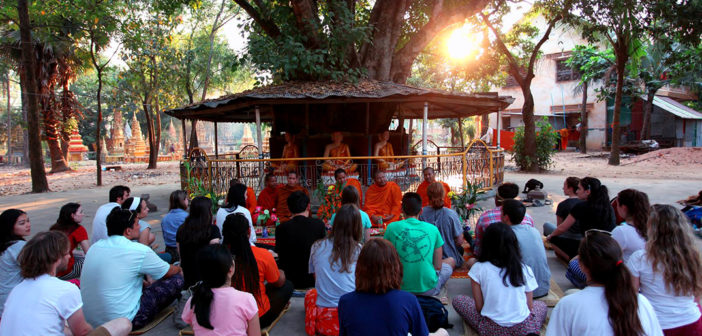An ancient Cambodian prophecy once predicted a day would come when no more citizens would remain than could fit under the shade of a Banyan tree.
In the 1970s this prophecy seemed nothing more than a scary bedtime story. Known as “the Island of Peace,” Cambodia was able to avoid the conflicts that dominated Southeast Asia at the time. Compared to the brutal wars in Vietnam and Thailand, Cambodia was a safe haven.
All that changed with the rise of the Khmer Rouge, a radical political movement whose end goal was a complete reconstruction of the nation’s social and political landscape. Under its new leadership, the Cambodian government targeted those who were the most capable of opposing their regime, among the most persecuted were doctors, teachers and cultural intellects. Waves of intellectuals were killed, leaving no one to pass down knowledge to the following generations.
When the Khmer Rogue was eventually overthrown and Cambodia looked to rebuild itself, it had to do so without 25 percent of its total population and virtually none of its educated class.
“They were left with no educated people, and if you have no teachers, who’s going to teach?” Jenna Pastorini, ’17, said.
Today, the non-profit organization Caring for Cambodia raises money to build schools and provide K-12 education to thousands of impoverished children.
Since its inception in 2003, CFC has built and developed schools 21 schools in the Siem Reap area of Cambodia. According to its website, statistics indicate that schools involved in the CFC program increase enrollment over a five-year period by an average of 70 percent, and the organization runs with the help of over 4,000 financial supporters and over 250 committed volunteers. Among those volunteers is Lehigh’s Caring for Cambodia partnership.
Lehigh’s CFC partnership also works with the College of Education and the interdisciplinary Global Citizenship program, which aim to increase the global footprint of the university’s students and faculty members.
Corina Fitzgerald, ’17, and Harrison Birabaharan, ’18, spent their summers teaching at CFC schools for their Iacocca internships. Pastorini spent her summer in Cambodia conducting independent research on the perceptions of mental health. Pastorini and Fitzgerald are co-presidents of Lehigh’s Caring for Cambodia chapter.
While on their internships, Fitzgerald and Birabaharan worked to improve students’ education.
“There was second grade English and fourth grade English, but no third grade curriculum,” Fitzgerald said. “I helped develop it to bridge the gap between the two.”
She worked to see what they were teaching in other subjects to translate that into basic English.
Birabaharan taught high school students art. He described art as a coping mechanism for many, considering the country’s dark past. Singing was also an integral part of his classroom, as well as Cambodian culture. He recounted how one day the speakers stopped working, so his students simply began singing.
“I was at the gym and everyone started singing,” Birabaharan said. “Everyone in Cambodia is so happy and friendly.”
CFC works to provide a real education system regardless of gender or status. Staff go into the villages and, if necessary, ask families why their child hasn’t attended school. Fitzgerald said this proactive mindset shows they want everyone to succeed and move on to a higher level of education.
Things like menstruation can keep girls out of school, and some families may not want to pay to keep them in school. CFC focuses on gender equity, allowing girls the chance to succeed as much as boys do. Fitzgerald said they discuss the importance of going to school and treating daughters the same way they treat sons with students’ parents.
“CFC’s end goal is to give up the entire program back to the country so it can be implemented country wide,” Pastorini said.
The organization works with the people it’s helping rather than telling them what to do, as many non-governmental organization with good intentions end up doing. The majority of CFC staff is native to Cambodia, rather than coming from Western areas.
“The need for schools stems from a genocide that occurred in the country during the 1970s, leaving corrupt systems in place,” Pastorini said. “Caring for Cambodia was so needed, as success in school was correlated to how wealthy you were.”
Lehigh’s CFC chapter hopes to raise $10,000 this school year. They raised over $400 recently during a Chipotle fundraiser, and they also had a successful fundraiser earlier this year at Revolutions.
CFC is hosting a fundraiser at Broadway Social on Thursday for those over 21 years old. There will also be the second annual pumpkin sale, where pumpkins have Khmer writing on them. They said a gala and silent auction may even be possibilities the future.






Comment policy
Comments posted to The Brown and White website are reviewed by a moderator before being approved. Incendiary speech or harassing language, including comments targeted at individuals, may be deemed unacceptable and not published. Spam and other soliciting will also be declined.
The Brown and White also reserves the right to not publish entirely anonymous comments.
1 Comment
Pingback: Caring for Cambodia improves Cambodian education system 40 years after genocide – Caring for Cambodia